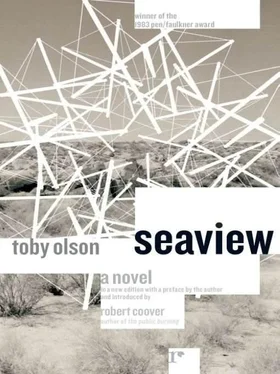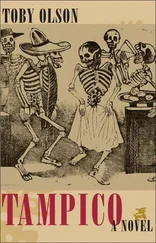It was Richard, finally, who found the way to handle it, but it was incidental that it should be him; it could as well have been Allen; there was not much difference. They both shifted a little at their ends of the enclosed space. They did tentative things with their knees, hips, and shoulders. The high brush seemed to push in on the three closed sides.
“This is it, man,” Richard said. “Are you ready?”
“I’m ready,” Allen said, and he adjusted his grip on the shaft of the four-iron.
They both felt the romance of it, and they both liked the feeling. Their brief words seemed to echo in the air, and they felt a strange kind of gratitude that each had spoken the words correctly and with sufficient drama. Each waited for the other to make his move. They felt they stood there for a very long time, looking at each other.
It was Richard who moved first. His hand came across his stomach and groped for the gun grip in his belt. He got it and jerked at the weapon. But the hammer had gotten hooked in his belt loop, and it would not come free. The crotch of his pants pulled up against his groin as he twisted and jerked again. Then Allen was moving. He fell into his stance and started the club head back quickly. When it came to the level of his shoulder, he squeezed the grip in his left hand and began to whip the club down at the swelling Ram. But it came down too quickly, and he knew that the head was gone. It had left the shaft in the force of his backswing, had probably loosened when he had hit the hangglider pilot, and it was flying behind him, spinning in the air into the brush. He saw Richard jerk again at the gun, the bottoms of his pants almost to his knees, the whiteness of his shins ridiculous above his black tennis shoes. He came automatically through the swing, and as his head came up, the tip of the headless shaft passed over the top of the ball, then continuing over his left shoulder. As he brought it down again, he pointed it at Richard as if it were a rapier, ineffectual at this distance, and then he saw the gun come loose as the belt tore free, the pants fly ripping away, and Richard’s hand thrown up from the force over his head with the gun in it. He had an urge to leap for him, but before he could do it the gun came back down, and Richard, with right arm extended, fell into a crouch and brought his left hand to his right wrist, aiming at Allen’s chest. They both stood very still. Then Richard grinned at Allen, and then he pulled the trigger.
There was a sharp pop, like the sound of a child’s cap pistol, and then, for a moment, there was nothing, and then the bullet came. It appeared in the mouth of the barrel, seemed to pause there for a moment, and then it slid out into the air, rose slightly, and when it reached its arc it began to fall. When it hit in the rough grass in the space between them, it disappeared, making no sound. Richard fired again; another bullet came out, arced also, and fell between them. When he pulled the trigger for the third time, nothing happened at all.
They went at each other then as if they were in the same dream. They both felt heavy-footed, and they tried to drop their instruments, but could not release them. Richard stumbled toward the cliff as he threw his arm out, trying to get rid of his gun. His pants were falling, and he reached down with his left hand to get them, but missed, and they came down around his knees. Allen whipped at him with the headless club shaft, but he did so as Richard reached for his belt, and the shaft sailed over his head, the force of the intended blow spinning Allen around. When he came through his turn again, they had come to the lip and were falling. Allen reached out for Richard, groping for something to hold to at his neck, but there was nothing there. He caught only the edge of his collar, briefly, jerking Richard’s face close to his own. There was a place in which they were embraced and turning, where they could not see land or sky. The sea was empty and without limits, and there were no horizons.
SHE SAT IN THE SHADE ON HER TOWER, LEANING AGAINST the central core. She had thrust the golf bag away from her but had taken the binoculars out of it first. If she went to the notched edge of the parapet, she could let her hair down and he could climb up it and come to her. But her hair was dark and short, and she knew that if she had golden tresses she would cut them also, for only in that way could she be who she knew she was and not some romantic shadow. But it could be the witch who would climb up, who was really some dark wish in the story. She had never been one who was much inclined to wishing, and she could accept her choices and their results. Anyway, the story had been his story, she realized, and she was no more than the end of it, the tail at the end of the tale.
Would it have been better, really, some other way? She felt it might have, but she was not inclined to regrets. Still, she thought, when one is in such a position, one might be allowed the indulgence of sweet dreams of another life. She leaned the back of her head against the central core and closed her eyes in order to conjure up the possibilities of some past. She was not moved by memory, however, and she soon came back to herself.
She spent a few moments in gathering strength and resolve, and then she pushed against the cold stone behind her and struggled up to her feet and crossed slowly and carefully to the notched edge facing the golf course.
She lifted the compact binoculars to her eyes and began scanning the distances around her. They were very fine glasses, powerful but very steady, and they brought the distance to her sharply and in bright delineation, as if things far away were circled in her control and influence. She had always thought of them as an extravagance, but Allen had not.
She pointed the binoculars in the direction of the sea, but she could find nothing to focus on there. It was just pine tips and the sky above them. The sea itself was not within view. She didn’t look down at the fairway below the tower, nor did she train on what she might have seen of the rest of the course from where she stood. She turned slightly to the left, leaning in the notch, and she found that she could see to the highway running down the middle of the Cape. There were some cars moving there, and finding a landmark she remembered she lifted the glasses to where she thought the house was, but there were trees and hills in the way, and she could not see it. Then she brought the glasses back to the highway. She saw the cars again, and then she saw a slight figure, a woman, standing with her thumb out, a suitcase on the ground beside her, hitchhiking in the direction of the mainland.
The woman was at the bottom of a long and gradual descending of the road, and beyond her the highway moved gradually up again, until it disappeared over a western rise in the distance. She was low where she stood; it was getting late in the day, but she was in sunlight, and when Melinda sharpened the focus, she could see the textures of her clothing, the strands of her loose thin hair, and the heavy chain and emblem hanging from her neck. The suitcase on the ground beside her was boxy and cheap; her clothing, while not so cheap, seemed to be a box for her body to hide in: it guarded against definition, and it was only when a breeze pushed at her blouse that Melinda could see that her breasts were small. She was bent over slightly, her posture was poor, but it was familiar, and she had placed one foot slightly in front of the other. Her elevated arm was thin; her thumb, out in the air, was delicate, and she wore a ring on it. The cars were passing her by. The fine glasses were not heavy, and Melinda had adjusted them carefully so that their cups fit comfortably over her eyes.
The car came over the rise in the slow lane. It was moving slowly, and it only had to brake slightly and pull off the highway in order to roll up and stop beside her. It was an old convertible, almost an antique, a 1955 Buick Century, dark blue with shining whitewalls and a white, rolled-down top. It was very well kept but not fanatically so; it looked serviceable, weighty, rounded, and strong. It had a number of chrome porthole circles in the side of its front fender.
Читать дальше












